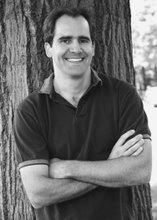Lab Full of Vultures?
 An article about my former advisor, Paul Turner, has appeared in this month's The Scientist1. I, for one, am quite happy that Dr. Turner did not follow thru on his "strange appreciation for carrion birds". Luckily for Dr. Turner's current and future students, his advisor Rich Lenski, "pointed out to Paul some of the scientific challenges of studying that sort of system."
An article about my former advisor, Paul Turner, has appeared in this month's The Scientist1. I, for one, am quite happy that Dr. Turner did not follow thru on his "strange appreciation for carrion birds". Luckily for Dr. Turner's current and future students, his advisor Rich Lenski, "pointed out to Paul some of the scientific challenges of studying that sort of system."
I went thru a similar experience in graduate school when I realized my previous study organisms, pronghorn, were somewhat unamenable to experimental research. Nor was funding for behavioral ecology readily apparent. During this period, I was confronted with the question, Are you doing science because you want to learn more about some charismatic mammal or do you want to address fundamental questions about evolutionary ecology?
Thus commenced my trip down the hierarchy of biological complexity: pronghorn > mosquitoes > C. elegans > bacteriophages. I'm happy where I ended up and I owe that to Dr. Turner for introducing me to the wild world of phages.
As the article points out, microbes are excellent organisms to use to decipher the underlying rules of biology. Dr. Turner has used them to great effect to study sex, game theory, and cheating.
Dr. Turner will be speaking at a Darwin Day celebration at my own school on February 13, 2009.
1 I confess to being rather startled when I turned the page in my hard copy of the December issue to see a closeup of Dr. Turner staring back at me.











I once heard a talk by Paul at ASM -- it was very interesting, and most importantly, clear even to someone like me who doesn't work on viruses. Often I end up going to a talk based on a cool abstract and find that the talk is really geared towards the one or two other labs working on the same problem rather than trying to present the work to the general scientific audience.
ReplyDeleteDidn't know that he was your advisor (or that Rich was his).
My impression is that a lot of students would answer your question differently: they are more interested in charismatic megafauna or working somewhere pretty than in answering important scientific questions. Of course, if their research can actually keep the megafauna or natural ecosystems from disappearing, maybe that's more urgent than some of our more fundamental questions.
ReplyDelete